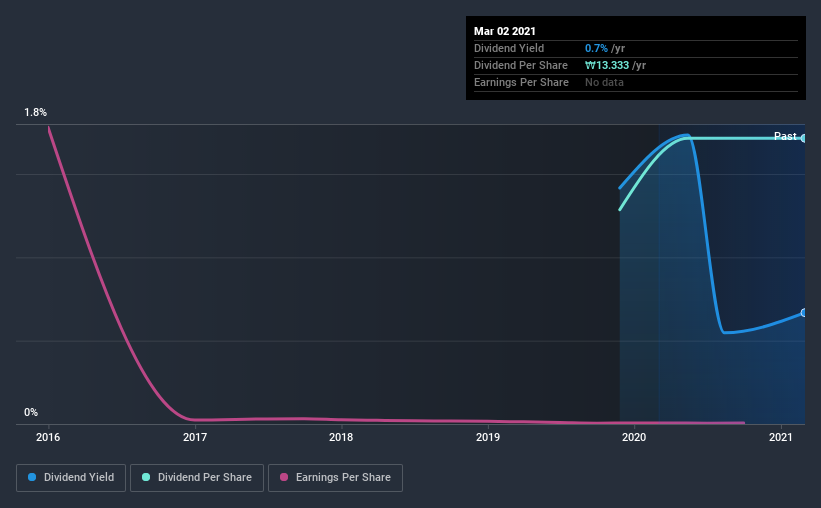- South Korea
- /
- Electronic Equipment and Components
- /
- KOSDAQ:A269620
Is Syswork Co., Ltd (KOSDAQ:269620) A Smart Choice For Dividend Investors?

Dividend paying stocks like Syswork Co., Ltd (KOSDAQ:269620) tend to be popular with investors, and for good reason - some research suggests a significant amount of all stock market returns come from reinvested dividends. On the other hand, investors have been known to buy a stock because of its yield, and then lose money if the company's dividend doesn't live up to expectations.
Syswork has only been paying a dividend for a year or so, so investors might be curious about its 0.7% yield. Remember though, given the recent drop in its share price, Syswork's yield will look higher, even though the market may now be expecting a decline in its long-term prospects. When buying stocks for their dividends, you should always run through the checks below, to see if the dividend looks sustainable.
Click the interactive chart for our full dividend analysis

Payout ratios
Dividends are usually paid out of company earnings. If a company is paying more than it earns, then the dividend might become unsustainable - hardly an ideal situation. Comparing dividend payments to a company's net profit after tax is a simple way of reality-checking whether a dividend is sustainable. Looking at the data, we can see that 40% of Syswork's profits were paid out as dividends in the last 12 months. A medium payout ratio strikes a good balance between paying dividends, and keeping enough back to invest in the business. Plus, there is room to increase the payout ratio over time.
We also measure dividends paid against a company's levered free cash flow, to see if enough cash was generated to cover the dividend. Syswork paid out 63% of its free cash flow last year, which is acceptable, but is starting to limit the amount of earnings that can be reinvested into the business. It's encouraging to see that the dividend is covered by both profit and cash flow. This generally suggests the dividend is sustainable, as long as earnings don't drop precipitously.
While the above analysis focuses on dividends relative to a company's earnings, we do note Syswork's strong net cash position, which will let it pay larger dividends for a time, should it choose.
Consider getting our latest analysis on Syswork's financial position here.
Dividend Volatility
Before buying a stock for its income, we want to see if the dividends have been stable in the past, and if the company has a track record of maintaining its dividend. With a payment history of less than 2 years, we think it's a bit too soon to think about living on the income from its dividend. Dividends per share have grown at approximately 33% per year over this time.
The dividend has been growing pretty quickly, which could be enough to get us interested even though the dividend history is relatively short. Further research may be warranted.
Dividend Growth Potential
The other half of the dividend investing equation is evaluating whether earnings per share (EPS) are growing. Growing EPS can help maintain or increase the purchasing power of the dividend over the long run. Syswork's EPS have fallen by approximately 68% per year during the past five years. With this kind of significant decline, we always wonder what has changed in the business. Dividends are about stability, and Syswork's earnings per share, which support the dividend, have been anything but stable.
We'd also point out that Syswork issued a meaningful number of new shares in the past year. Regularly issuing new shares can be detrimental - it's hard to grow dividends per share when new shares are regularly being created.
Conclusion
Dividend investors should always want to know if a) a company's dividends are affordable, b) if there is a track record of consistent payments, and c) if the dividend is capable of growing. Syswork's dividend payout ratios are within normal bounds, although we note its cash flow is not as strong as the income statement would suggest. Earnings per share are down, and to our mind Syswork has not been paying a dividend long enough to demonstrate its resilience across economic cycles. In sum, we find it hard to get excited about Syswork from a dividend perspective. It's not that we think it's a bad business; just that there are other companies that perform better on these criteria.
Market movements attest to how highly valued a consistent dividend policy is compared to one which is more unpredictable. However, there are other things to consider for investors when analysing stock performance. Just as an example, we've come accross 3 warning signs for Syswork you should be aware of, and 1 of them can't be ignored.
If you are a dividend investor, you might also want to look at our curated list of dividend stocks yielding above 3%.
If you decide to trade Syswork, use the lowest-cost* platform that is rated #1 Overall by Barron’s, Interactive Brokers. Trade stocks, options, futures, forex, bonds and funds on 135 markets, all from a single integrated account. Promoted
New: Manage All Your Stock Portfolios in One Place
We've created the ultimate portfolio companion for stock investors, and it's free.
• Connect an unlimited number of Portfolios and see your total in one currency
• Be alerted to new Warning Signs or Risks via email or mobile
• Track the Fair Value of your stocks
This article by Simply Wall St is general in nature. It does not constitute a recommendation to buy or sell any stock, and does not take account of your objectives, or your financial situation. We aim to bring you long-term focused analysis driven by fundamental data. Note that our analysis may not factor in the latest price-sensitive company announcements or qualitative material. Simply Wall St has no position in any stocks mentioned.
*Interactive Brokers Rated Lowest Cost Broker by StockBrokers.com Annual Online Review 2020
Have feedback on this article? Concerned about the content? Get in touch with us directly. Alternatively, email editorial-team (at) simplywallst.com.
About KOSDAQ:A269620
Syswork
Syswork Co., Ltd manufactures and sells clean room syatems, air conditioning systems, and ventilation control systems in South Korea.
Worrying balance sheet with weak fundamentals.
Market Insights
Community Narratives




